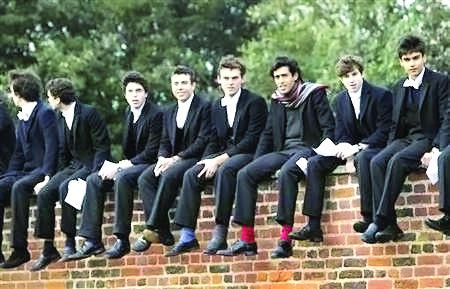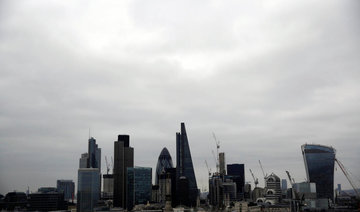LONDON: Enrollment of Middle East students to Britain’s top public schools is on the rise, as the country’s leading educational establishments draw an increasing mix of international pupils.
Britain’s most prestigious schools are set to welcome a fresh intake of international students in the next three weeks as the 2017/18 academic year gets underway.
Enrollments in British schools from the Middle East rose by almost 14 percent over the last year, according to the Independent Schools Council (ISC).
From the £39,000-a-year ($50,000) Harrow School, where many of the Jordanian royal family were educated, to Eton College, previously attended by royals including Kuwait’s Sheikh Mohammed Abdullah Al-Mubarak Al-Sabah – British public schools have long been popular with the region’s wealthy elite.
They are increasingly being joined by students from Asia.
Chinese students make up the highest proportion of overseas pupils by far, with the number of Chinese pupils in UK private schools increasing by more than 190 percent in the past 10 years.
According to Knight Frank’s 2017 Wealth Report, the number of ultra-high net worth individuals worldwide – including the Middle East — has jumped by 42 percent in the last decade to 193,000, and these super-rich are looking overseas to educate their children.
In a survey of nearly 900 private bankers and wealth advisers, 40 percent with clients in the Middle East said the super-rich individuals they work with – earning $30 million or over – are more likely to look overseas for a good school for their children than to educate them in their own country.
The Knight Frank survey also stated that the UK is set to become especially attractive to the ultra-wealthy, now that the fallen value of the pound has made it cheaper to send their children to UK private schools.
Liam Bailey, global head of research, Knight Frank, told Arab News: “The UK has been always been a preferred choice for education and, as more wealth is created, around the world there are more parents who can afford this education.”
Bailey said that as economies have become more globalized, “the benefits of an English education have become more important.” He added: “UK schools have become more diverse over time and are now seen as a place to build international networks for students.”
Bailey commented that Britain’s weak pound would likely be a contributing factor to the country’s schooling appeal, although it would not be “the first driver.”
Duncan Quirk, marketing manager at Education Advisers, said that most students in UK private schools come from backgrounds where the fees are of little relevance.
“British boarding school fees are above the average UK annual wage, so it can be argued that a 10-15 percent difference in exchange makes little difference to the real affordability of these schools. Does a 15 percent reduction of something very expensive change its affordability? Not really,” he said.
However, Quirk conceded that international parents are now likely comparing these fees with what they pay for the private schools in the Middle East.
“Perhaps they realize that the excess required to study in the UK has now narrowed, making UK boarding schools a more attractive proposition in comparison to what is available at home.”
Quirk also said he has witnessed more parents from the Middle East region requesting impartial advice on boarding school choices over the past five years.
He said: “While the majority of our inquiries used to be from British expats, recent years have seen us receive a growing number of advice requests from Middle Eastern parents. We also receive almost weekly requests from people looking to leverage our expertise and start their own education advice businesses in the Middle East region.”
Quirk said he expected the UK’s schools to welcome many more Middle East students in the coming years because the market for global education has matured rapidly in the region.
“Parents are much more well-informed than they used to be, and want to provide the best possible education for their children. There are plenty of international schools in the Middle East, but parents are becoming increasingly aware that these rarely match the academic achievements and extra-curricular opportunities set by their UK counterparts. There is also so much more choice in the UK, so they can find a school which is the best match for their child’s ability and aspirations.”
Quirk added that the students themselves are more interested in studying overseas than they were a generation ago.
“The Internet and globalization has seen to that and needs no further explanation. Middle East students know the UK is a great place to come for both their academic and personal development.”
According to Dean Hoke, co-founder and principal of Edu Alliance, a higher education consulting firm based in Abu Dhabi, the UK education system is reaping the spoils of being a major influence in the GCC region “for the past 150 years”.
He said: “Many of the leaders of the region attended British schools and universities over the years and the quality of British education is held in high regard. To this day the UK is still a desirable international location for their children to attend school if they are not staying in their home country.”
Prestige and the weak pound draw wealthy Arabs to UK schools
Prestige and the weak pound draw wealthy Arabs to UK schools

Shooter kills 9 at Canadian school and residence

- The shooter was found dead with an apparent self-inflicted gunshot wound
- A total of 27 people were wounded in the shooting, including two with serious injuries
TORONTO: A shooter killed nine people and wounded dozens more at a secondary school and a residence in a remote part of western Canada on Tuesday, authorities said, in one of the deadliest mass shootings in the country’s history.
The suspect, described by police in an initial emergency alert as a “female in a dress with brown hair,” was found dead with an apparent self-inflicted gunshot wound, officials said.
The attack occurred in Tumbler Ridge, British Columbia, a picturesque mountain valley town in the foothills of the Rockies.
A total of 27 people were wounded in the shooting, including two with serious injuries, the Royal Canadian Mounted Police said in a statement.
Prime Minister Mark Carney said he was “devastated” by the “horrific acts of violence” and announced he was suspending plans to travel to the Munich Security Conference on Wednesday, where he had been set to hold talks with allies on transatlantic defense readiness.
Police said an alert was issued about an active shooter at Tumbler Ridge Secondary School on Tuesday afternoon.
As police searched the school, they found six people shot dead. A seventh person with a gunshot wound died en route to hospital.
Separately, police found two more bodies at a residence in the town.
The residence is “believed to be connected to the incident,” police said.
At the school, “an individual believed to be the shooter was also found deceased with what appears to be a self?inflicted injury,” police said.
Police have not yet released any information about the age of the shooter or the victims.
“We are devastated by the loss of life and the profound impact this tragedy has had on families, students, staff, and our entire town,” the municipality of Tumbler Ridge said in a statement.
Tumbler Ridge student Darian Quist told public broadcaster CBC that he was in his mechanics class when there was an announcement that the school was in lockdown.
He said that initially he “didn’t think anything was going on,” but started receiving “disturbing” photos about the carnage.
“It set in what was happening,” Quist said.
He said he stayed in lockdown for more than two hours until police stormed in, ordering everyone to put their hands up before escorting them out of the school.
Trent Ernst, a local journalist and a former substitute teacher at Tumbler Ridge, expressed shock over the shooting at the school, where one of his children has just graduated.
He noted that school shootings have been a rarity occurring every few years in Canada compared with the United States, where they are far more frequent.
“I used to kind of go: ‘Look at Canada, look at who we are.’ But then that one school shooting every 2.5 years happens in your town and things... just go off the rails,” he told AFP.
‘Heartbreak’
While mass shootings are extremely rare in Canada, last April, a vehicle attack that targeted a Filipino cultural festival in Vancouver killed 11 people.
British Columbia Premier David Eby called the latest violence “unimaginable.”
Nina Krieger, British Columbia’s minister of public safety, said it was “one of the worst mass shootings in our province’s and country’s history.”
The Canadian Olympic Committee, whose athletes are competing in the 2026 Winter Games in Italy, said Wednesday it was “heartbroken by the news of the horrific school shooting.”
Ken Floyd, commander of the police’s northern district, said: “This has been an incredibly difficult and emotional day for our community, and we are grateful for the cooperation shown as officers continue their work to advance the investigation.”
Floyd told reporters the shooter was the same suspect police described as “female” in a prior emergency alert to community members, but declined to provide any details on the suspect’s identity.
The police said officers were searching other homes and properties in the community to see if there were additional sites connected to the incident.
Tumbler Ridge, a quiet town with roughly 2,400 residents, is more than 1,100 kilometers (680 miles) north of Vancouver, British Columbia’s largest city.
“There are no words sufficient for the heartbreak our community is experiencing tonight,” the municipality said.














